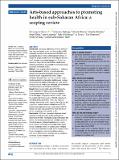Files in this item
Arts-based approaches to promoting health in sub-Saharan Africa : a scoping review
Item metadata
| dc.contributor.author | Bunn, Christopher | |
| dc.contributor.author | Kalinga, Chisomo | |
| dc.contributor.author | Mtema, Otiyela | |
| dc.contributor.author | Abdulla, Sharifa | |
| dc.contributor.author | DIllip, Angel | |
| dc.contributor.author | Lwanda, John | |
| dc.contributor.author | Mtenga, Sally M. | |
| dc.contributor.author | Sharp, Jo | |
| dc.contributor.author | Strachan, Zoë | |
| dc.contributor.author | Gray, Cindy M. | |
| dc.date.accessioned | 2020-06-23T15:30:02Z | |
| dc.date.available | 2020-06-23T15:30:02Z | |
| dc.date.issued | 2020-05-21 | |
| dc.identifier | 268344570 | |
| dc.identifier | c7294792-ce80-44a0-ba83-fb40489242ce | |
| dc.identifier | 85085482464 | |
| dc.identifier | 000573885600020 | |
| dc.identifier.citation | Bunn , C , Kalinga , C , Mtema , O , Abdulla , S , DIllip , A , Lwanda , J , Mtenga , S M , Sharp , J , Strachan , Z & Gray , C M 2020 , ' Arts-based approaches to promoting health in sub-Saharan Africa : a scoping review ' , BMJ Global Health , vol. 5 , no. 5 , e001987 . https://doi.org/10.1136/bmjgh-2019-001987 | en |
| dc.identifier.issn | 2059-7908 | |
| dc.identifier.uri | https://hdl.handle.net/10023/20131 | |
| dc.description | This study was jointly funded by the UK’s Medical Research Council and Arts and Humanities Research Council, as part of the Global Challenges Research Fund- reference number MR/R024448/1. CK is funded by a Wellcome Trust Medical Humanities Fellowship. | en |
| dc.description.abstract | Introduction Arts-based approaches to health promotion have been used widely across sub-Saharan Africa (SSA), particularly in public health responses to HIV/AIDS. Such approaches draw on deep-rooted historical traditions of indigenous groups in combination with imported traditions which emerged from colonial engagement. To date, no review has sought to map the locations, health issues, art forms and methods documented by researchers using arts-based approaches in SSA. Methods Using scoping review methodology, 11 databases spanning biomedicine, arts and humanities and social sciences were searched. Researchers screened search results for papers using predefined criteria. Papers included in the review were read and summarised using a standardised proforma. Descriptive statistics were produced to characterise the location of the studies, art forms used or discussed, and the health issues addressed, and to determine how best to summarise the literature identified. Results Searches identified a total of 59 794 records, which reduced to 119 after screening. We identified literature representing 30 (62.5%) of the 48 countries in the SSA region. The papers covered 16 health issues. The majority (84.9%) focused on HIV/AIDS-related work, with Ebola (5.0%) and malaria (3.3%) also receiving attention. Most studies used a single art form (79.0%), but a significant number deployed multiple forms (21.0%). Theatre-based approaches were most common (43.7%), followed by music and song (22.6%), visual arts (other) (9.2%), storytelling (7.6%) and film (5.0%). Conclusions Arts-based approaches have been widely deployed in health promotion in SSA, particularly in response to HIV/AIDS. Historically and as evidenced by this review, arts-based approaches have provided a platform to facilitate enquiry, achieved significant reach and in some instances supported demonstrable health-related change. Challenges relating to content, power relations and evaluation have been reported. Future research should focus on broadening application to other conditions, such as non-communicable diseases, and on addressing challenges raised in research to date. | |
| dc.format.extent | 15 | |
| dc.format.extent | 1227215 | |
| dc.language.iso | eng | |
| dc.relation.ispartof | BMJ Global Health | en |
| dc.rights | Copyright © Author(s) (or their employer(s)) 2020. This is an open access article distributed in accordance with the Creative Commons Attribution 4.0 Unported (CC BY 4.0) license, which permits others to copy, redistribute, remix, transform and build upon this work for any purpose, provided the original work is properly cited, a link to the licence is given, and indication of whether changes were made. See: https://creativecommons.org/licenses/by/4.0/. | en |
| dc.subject | Health education and promotion | en |
| dc.subject | Health policy | en |
| dc.subject | Review | en |
| dc.subject | RA0421 Public health. Hygiene. Preventive Medicine | en |
| dc.subject | Health Policy | en |
| dc.subject | Public Health, Environmental and Occupational Health | en |
| dc.subject | NDAS | en |
| dc.subject | SDG 3 - Good Health and Well-being | en |
| dc.subject.lcc | RA0421 | en |
| dc.title | Arts-based approaches to promoting health in sub-Saharan Africa : a scoping review | en |
| dc.type | Journal item | en |
| dc.contributor.institution | University of St Andrews.School of Geography & Sustainable Development | en |
| dc.identifier.doi | 10.1136/bmjgh-2019-001987 | |
| dc.description.status | Peer reviewed | en |
This item appears in the following Collection(s)
Items in the St Andrews Research Repository are protected by copyright, with all rights reserved, unless otherwise indicated.

